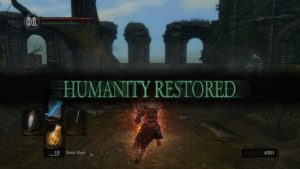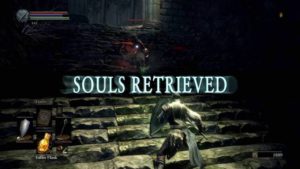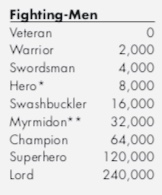
On Twitter (!) recently, @BrianBloodaxe brought up level drain, which reminded me how I ran it in OD&D for Vaults of Pahvelorn. What follows is a slight refinement of my previous approach, which I based originally on ideas from Talysman (of the 9 and 30 kingdoms blog).
In my revision of this method, adventurers lose levels without losing any XP. Adventurers continue to accumulate XP as normal, and gain back all lost levels, along with the benefits of a new level, upon reaching the next level threshold. The adventurer can also retrieve the benefits of lost levels by confronting, and defeating, the particular violating spirit. Additionally, an encounter with the abyss changes, hopefully temporarily, the adventurer’s relation to world of sunlight, joy, and the living, represented by a randomly determined abyssal disturbance—see table at the bottom of this post. An adventurer drained to zero rises as a hostile spirit with the sole purpose in unlife of opposing the adventuring party. As with partial drain, the adventurer’s humanity can be restored by defeating the violating spirit, though in this case the responsibility of doing so would fall to other adventurers.

This approach has several consequences. First, the player loses no progress, in an absolute sense, as accumulated XP remains. The adventurer’s individual effectiveness decreases, but only transiently. Second, the ability to regain levels by defeating the violating spirit presents a particularly salient all or nothing dilemma for players in the moment of the original confrontation, as continuing the fight to victory would immediately return drained levels while fleeing to regroup would—at least temporarily—lock in the lost levels. Third, the disturbance shifts gameplay ambivalently, providing both handicap and potential utility, at least for a player that approaches the disturbance creatively.

For example, imagine a 4th level OD&D fighter—a “hero”—having 9000 XP at the time of original confrontation. In an encounter with a wight, the adventurer loses two levels. This means the character attacks, saves, and so forth, as a second level character. Values other than HD tend to change only every few levels, so the only effect might be a temporary HD reduction, though in this example case—going from level 4 to level 2—the improvement threshold for fighters is between level 3 and 4, so the adventurer would need to use different rows for both saves and attacks as well. The adventurer must accumulate 7000 XP to gain back lost levels the hard way (since 9000 + 7000 = 16000, the threshold for level 5), and upon becoming a swashbuckler would immediately jump in effectiveness from a 2nd level fighter to a 5th level fighter. A quicker, side-quest style, approach would be to track down the wight and defeat it—something that might require only a session or part of a session of play, depending on the particular circumstances. For magic-users, if I were using the traditional spell progression, I would mark the spell slots associated with the lost levels as tainted by the abyss, and improvise some sort of thematic corruption side effect for spells using those slots, rather than just decrease spell slots.

Level drain becomes more clearly a sort of PTSD from confrontation with the undead. Seeking out and confronting the violating spirit represents the adventurer facing, and overcoming, the fears associated with past experiences. Or facing the danger and faltering—the possibility of which makes potential overcoming more valuable. The experiences were shared by the player, the human at the game table, and the player presumably had some degree of involvement, making the imagined meaning consequential. In other words, the game mechanics and the imagined events dovetail, but avoid the bookkeeping and tedium associated with some other approaches to handing level drain.
Below are 10 potential disturbances. I have tried to design each to satisfy three constraints: consistency with the theme of undead trauma, an aspect that complicates the adventurer’s life, and an aspect that could have unexpected benefits, either due to randomness or creative use by players. Upon regaining levels, I would let the player decide whether to keep the disturbance or overcome that as well.
Abyssal Disturbances (1d10)
- Your shadow detaches during combat and either fights for you or fights against you—50% chance each.
- Touch chills water—1 turn to freeze a small quantity—and breath is permafrost.
- Speech from self and others nearby is muffled to a whisper.
- Develops an unerring internal compass for, and scent enticing to, poisonous creatures.
- Unlocked dungeon doors open upon approach and close on passing.
- Vision becomes dim except by moonlight, under which the character can read lost languages with a 1 in 6 chance—one try per text.
- Gains sustenance only from consuming raw flesh and dining upon a creature provides an unerring internal compass for seeking out the creature dined upon, if it still lives.
- Light sources near the adventurer provide only half illumination and the adventurer can extinguish mundane light sources by starting at them (takes one turn).
- Skies become overcast in a matter of hours wherever the adventurer goes.
- There is a 50% chance that conscious beings slain by the adventurer rise as wights or wraiths which are invulnerable to harm caused by the adventurer and also seek to do the adventurer no harm directly, but will make the greatest attempt to harm all those nearby or associated with the adventurer.
Somewhat related, a while back I created a list of 30 “marked by the grave” effects which could also apply, though the results in that list focus more on theme and less on ambivalent game mechanical effects.

You cracked it! This is the best take on energy drain I’ve seen, will definitely be making use of it. I’d expect nothing less from a man with love for Dark Souls.
Tracking down the level drainer and taking those levels back – genius.
Both the transient nature of the level drain (instead of permanent) and being able to get those souls back are great inventions. Will definitely be using this method from now on–that is to say, will be using this now because level draining formally felt so unfun I almost never used it.
Awesome idea for adding fun possibilities to the game! .
Revenge vs. the particular undead level-stealer will be a great driver of PC motivation, and a way for certain players (those who hunger for a more sharply-defined “plot” and “narrative”) to be able to shape a compelling player-centered, player-driven narrative amidst what might otherwise seem to them a series of random events and encounters.
Without too-generous player-improvised story-curveballs, and without the much-maligned DM-planned linear railroading, the play reports will be more interesting for players to recount afterwards. For example: “We went in the abandoned mines looking for gold, and encountered X, Y, and Z” vs. “We went in the abandoned mines for the 2nd time, on a quest to help our ailing comrade Ricimer destroy the wraith of King Baldus and restore his stolen soul. We killed X, avoided Y, and killed Z on the way to King Baldus’s crypt, had a titanic battle, barely vanquished the wraith, and limped back to the surface, luckily avoiding A and destroying B with the help of Ricimer’s regained abilities.”
I like the Abyssal Disturbances effects a lot, too, and that some have unexpected benefits.
New reader of the blog : may i ask for a top 10/best of OSR modules/ruleset ? thanks
5 systems:
Lamentations of the Flame Princess
Labyrinth Lord
Basic Fantasy Role-Playing Game
Dungeon Crawl Classics
Into the Odd
5 modules
Better Than Any Man
The Tower of the Stargazer
Slumbering Ursine Dunes (and its 3 sequels, under Hill Cantons name)
Death Frost Doom
Gathox Vertical Slum
Operation Unfathomable
That is a good list, though I would sub the original B/X D&D in for Basic Fantasy and I haven’t read Gathox.
I started to put together my own list, but it morphed into a slightly more involved post. Stay tuned!